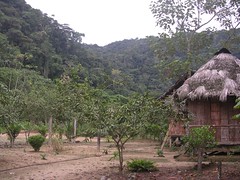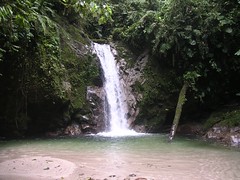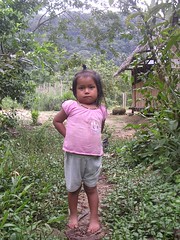Ecotourism, communitarian tourism, ecolodges, ecoresorts are just many names which refer to the same experience: coming in contact with the rain forest and the people (aboriginal peoples) that inhabit it. In the case of the Amazon, because a good part of its future goes necessarily through this type of tourism, we want to give some suggestions, fruit of our experience. Firstly, you should consider that it’s difficult, if not impossible, the integration in the indigenous communities of the forest, there are too many differences. The only way to try a deeper approach to this world it’s to go there as volunteer (voluntourism): in this case better to get information in Quito on the options available, remembering that usually the period of cooperation is at least 3-6 months and that often the volunteers are asked to pay in order to cover expenses and registration fee. If instead you are travelers or tourists, our suggestion is to directly go to one of the cities/entrance gate towards the Amazon (in the case of Ecuador: Tena, Puyo, Macas, Coca or Lago Agrio) and spend there some days, trying to get information or better to know a person able to indicate you the communities that receive visits in the forest. A smart trick is to go to the travel agencies which offer organized tours and ask for their destinations; sure they will deny, but you will always be able to find a passage by bus, canoe or taxi towards the same place. Currently, Kichwa communities in the region of Tena (Napo) offer lodging in wooden cabañas and food for approximately 10 dollars a day. In this case, what you will be able to see is limited to the nearest attractions, unfortunately it’s impossible to explore the forest as independent traveller. Therefore, you’ll have the problem to find a guide who could accompany you in the remote places. After all, especially in the event your group isn’t numerous, it would be better to buy an organized tour by any travel agency, maybe after verifying that your money will be used for the development of the community itself. Last consideration: locals always deny, but tropical diseases exist (dengue, malaria, etc)… avoiding paranoias, take necessary precautions.
For many travelers the ecotourism in the Amazon it’s just a waste of time and money, but with an intelligent approach, it could transform in an opportunity to know and help to preserve one of the most incredible ecosystems of our planet.
An Amazon indigenous community
Sinchi Sacha means “strong forest” in the Kichwa indigenous language. Carlito, our young guide, knows every centimeter of his world, the forest; with his machete opens a way that knows by heart, he follows the “songlines” traced by his ancestors. While we listen to the fascinating lesson on the animals, trees and medicinal plants, we exceed crystalline water torrents, vine forests, mariposarios (humid cliffs where the tropical butterflies flock together) and we reach fabulous cascades dipped in the luxuriant jungle. After walking for hours we lose the orientation: the snazzy colors of the flowers, the infinite shades of green, the cries of the animals, the sound of the rain falling on the leaves, the humidity smell that every minute becomes deeper and wilder… an outbreak of emotions that take shape and dissolve in the palette of a painter, in the symphony of a single artist: the nature in all its strong creativity.
Tena, a look to the Amazon
Now we are really in the Amazon basin… to make it clear, there are the curious smiles of the children who run towards the bus. In their black eyes and smooth like silk hairs, it’s hidden all the mystery of these wild places. Here humans continue to be just simple appearances, while nature shows itself exuberant and tenacious. Therefore, it’s a world that comes out from ancestral memories: we caress a boa and we perceive its uncontrollable power, we play with some monkeys and we perceive their likeness. Our friend, Gabriel, is a sturdy but pleasant man, son of the forest, born in a Kichwa (Quichua) indigenous community: he seems to have many stories to tell and a slight nostalgia for a world that inexorably goes away and refuses him. Tena is a city which denies the idea itself of the Amazon rainforest, even though it’s totally embedded in the jungle. Meanwhile it’s raining, raining and raining…


